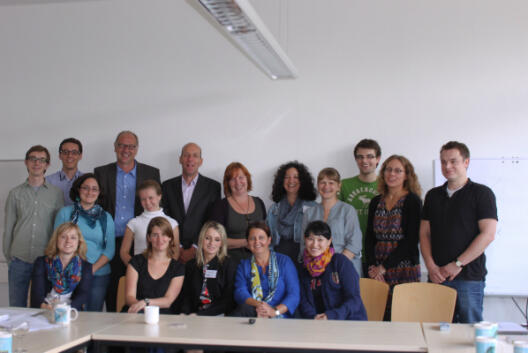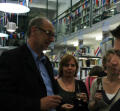Photos

EUROLOC Summer School 2012 (Münster)
The 2012 Summer School on "Urban Innovation ", supported by EUROLOC was hosted by the chair of local and regional affairs at the Institute of Political Science and financially supported by the University of Münster. The summer school took place from September 10th to SSeptember 16th 2012 in Münster, Germany. The 2012 Summer school on Urban Innovation focused on different fields of research and innovation and offered a unique chance for PhD students to discuss own research projects and proposals with other doctoral students and leading European local government researchers.
Urban innovation
Local government is regarded as the foundation stone of democracy. It is also seen as a laboratory for new trends and innovations. Here most new pilot projects and concepts are tested and implemented. The 2012 Summer School aims at organizing specialized courses for Ph.D. students whose research topics are related to the field of public policies and local government. Given the latest institutional reforms that have been made in countries such as the UK, Germany but also Netherlands, Denmark and Norway, this year’s Summer School puts an emphasis on the evaluation of innovation, transfer of knowledge as well as research methodology and focuses on "urban innovation" in different fields.
Firstly numerous Democratic innovations can be observed at the local level. New forms of direct democracy as well as new dialogical deliberative instruments are implemented. These are often combined with Electronic innovation. Pilot projects of Internet voting as well as electronic information systems, open data as well as web 2.0 instruments are enriching local politics. Administrative innovation was strongly influenced by new public management reforms and new information and communication technologies. Fiscal innovation is an reaction to the fiscal problems in Europe and about policies and strategies to overcome unfunded mandates and structural financial crisis at the local level. Planning and structural innovation can be seen in the field of structural and territorial reforms. Here different policies try to overcome general problems of demographic change and urbanization by new settings of local functions as well as forms of inter-communal cooperation etc. Finally social innovation focuses on new instruments in the field of social policies.
Thematic sessions:
1. Theory of local innovation
2. Digital city and innovation
3. Democratic Innovation
4. Public management, administrative Innovation
5. Urban planning and innovation
6. Social innovationProgram
The local organizers planned an interactive program for on-going research and several workshops with constant guidance from the professors. More specifically: Three types of activities conducted:
- a series of lectures
- presentation of research papers and selected literature by participants
- field visits to local government institutions
The most important facts:
- Selected keynote speeches included two parts (lecture and discussion) with the participants.
- Supplementary literature, suggested readings and course syllabus concerning each topic distributed to the participants prior to the Summer School.
- Participants must prepared an extended abstract (1.200 words) of their Ph.D. research, which forwarded to the teachers by the end of August.
- Concerning supervision of participant students, each professor was responsible for 5-6 persons (working group), whose Ph.D. research was closer to his/her topic. Additionally students got advice from all other professors as well.
- Students presented their own research. All students attended every lecture and all sessions and were able to take part in all discussions.
















